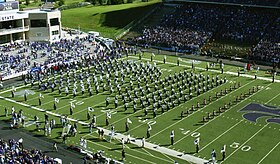
Kansas State University is a public land-grant research university with its main campus in Manhattan, Kansas. It was opened as the state's land-grant college in 1863 and was the first public institution of higher learning in the state of Kansas. It had a record high enrollment of 24,766 students for the Fall 2014 semester.
A fight song is a rousing short song associated with a sports team. The term is most common in the United States and Canada. In Australia, Mexico, and New Zealand, these songs are called the team anthem, team song, or games song. First associated with collegiate sports, fight songs are also used by secondary schools and in professional sports.

Rupp Arena at Central Bank Center is an arena located in downtown Lexington, Kentucky, United States. Since its opening in 1976, it has been the centerpiece of Central Bank Center, a convention and shopping facility owned by an arm of the Lexington-Fayette Urban County Government, which is located next to the Lexington Hyatt and Hilton hotels. Rupp Arena also serves as home court to the University of Kentucky men's basketball program, and is named after legendary former Kentucky coach Adolph Rupp with an official capacity of 20,500. In 2014 and 2015, in Rupp Arena, the Kentucky Wildcats men's basketball team was second in the nation in college basketball home attendance. Rupp Arena also regularly hosts concerts, conventions and shows.

"The Great Rock Island Route", popularized as "Wabash Cannonball" and various other titles, is a 19th-century American folk song that describes the scenic beauty and predicaments of a fictional train, the Wabash Cannonball Express, as it traveled on the Great Rock Island Railroad. The song has become a country music staple and common marching band repertoire. The only train to actually bear the name was created in response to the song's popularity, the Wabash Railroad renaming its daytime express service between Detroit and St. Louis the Wabash Cannon Ball from 1949 until discontinuation during the formation of Amtrak in 1971.

Bill Snyder Family Stadium is a stadium in Manhattan, Kansas. It is used for American football, and is the home field of the Kansas State University Wildcats football team. It is named after the family of head coach Bill Snyder. Over the past 31 seasons – from 1990 through the 2022 season – K-State is 169–51–1 (.767) at home.
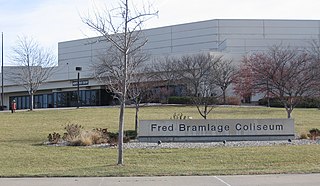
Fred Bramlage Coliseum is a multi-purpose indoor arena in Manhattan, Kansas, with an official capacity of 11,000. It is the home to the Kansas State University men's and women's basketball teams, and serves as an alternate venue for Kansas State's women's volleyball team. The facility currently holds offices for various administrative and business units for K-State Athletics, and the track & field team. Bramlage was previously the home for other K-State team offices, including women's soccer and baseball.

"Mighty Bruins" is a fight song of University of California, Los Angeles sports teams. Composed by Academy Award-winning composer Bill Conti, the song was commissioned by the UCLA Alumni Association on its fiftieth anniversary. It debuted in 1984 at the football game against Stanford University, with the school marching band conducted by Conti himself.
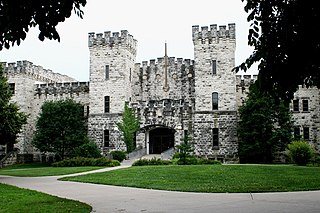
Nichols Hall is a building on the campus of Kansas State University. This building was originally built in 1911 and appears from the exterior as a castle with battlements. Its interior was destroyed by fire in 1968; the structure was rebuilt in 1985. The building currently houses the A.Q. Miller School of Media and Communication and the School of Music, Theatre, and Dance.
"Victory for MSU", formerly "MSU Fight Song", is the official fight song of Michigan State University. It was created in early 1915, when MSU was known as Michigan Agricultural College (M.A.C.). An MSU cheerleader, Francis Irving Lankey, along with lyricist Arthur Sayles, created the song. With several changes noted below, the school has used the same song ever since. The MSU Fight Song is played at all university sporting events and is frequently sung by students and alumni.

The New Hampshire Wildcats, or 'Cats, are the American intercollegiate athletic teams representing the University of New Hampshire (UNH), located in Durham. The wildcat is the school's official mascot, the colors are UNH Blue and white. The University of New Hampshire competes at the National Collegiate Athletic Association (NCAA) Division I level as a full member of the America East Conference, and sponsors teams in seven men's, eleven women's and one coed NCAA sanctioned sports. However, the men's and women's hockey teams are members of Hockey East, the gymnastics team is a member of the East Atlantic Gymnastics League (EAGL), and the ski team is a member of the Eastern Intercollegiate Ski Association (EISA). The football team plays as an associate member of the Coastal Athletic Association in the NCAA Division I Football Championship Subdivision, the second tier of Division I formerly known as Division I-AA.

“The Minnesota March” is a march for wind band written by John Philip Sousa in 1927 for the University of Minnesota. Sousa received an informal request for the march from Minnesota football coach Clarence Spears, and agreed to a request from a committee of university officials in October 1926. Sousa used Indian themes in this march, and later added field drum and bugle parts. The march was published by the Sam Fox Publishing Company and was premiered by Sousa and his band on September 3, 1927 at the Minnesota State Fair. It was first performed at the University of Minnesota the next month, on October 26, with a performance by the university band.
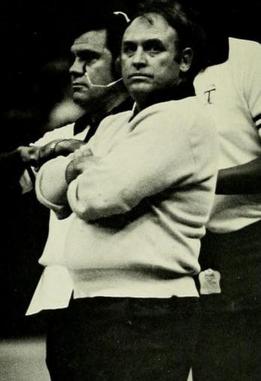
Vince Gibson was an American football player and coach. He served as head football coach at Kansas State University (1967–1974), the University of Louisville (1975–1979), and Tulane University (1980–1982), compiling a career college football record of 75–98–2. In 1992, he coached the New Orleans Night of the Arena Football League, tallying a mark of 0–10.
The "Go U Northwestern", originally titled "Go Northwestern Go", is one of the fight songs of Northwestern University.

The Kansas State University Marching Band, also known as "The Pride of Wildcat Land" or just The Pride, is a 375 piece marching band consisting of woodwinds, brass, percussion, color guard, dancers, and twirlers. It is the official band of Kansas State University.
"Big C" is a fight song of the University of California, Berkeley. It was composed in 1913 by Harold P. Williams, with lyrics by Norman Loyall McLaren. It was written to commemorate the construction of the large concrete "C" in 1905 on the "rugged Eastern foothills" of the Berkeley campus. The song was the winning entry in the Daily Californian school song competition in 1913. Arrangements of the tune are used by other schools in the University of California system.
On, On, U of K, also punctuated as "On! On! U of K", is a fight song at the University of Kentucky. Although it is primarily associated with the historically successful Kentucky Wildcats men's basketball program, the lyrics are actually specific to football. Aside from this song, the school is rarely referred to as "U of K" but simply as "UK."
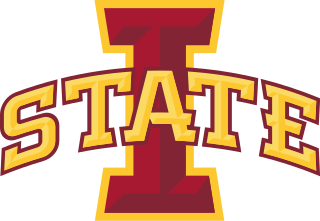
The Iowa State University Cyclone Football 'Varsity' Marching Band (ISUCF'V'MB) is the marching band of Iowa State University. Also known as the Cyclone Marching Band (CMB), it is nicknamed the "Pride of Iowa State", the "Best of the Midwest", and the "Varsity Band". The band performs in support of the Iowa State Cyclones football team at all home games and at some away games versus Big 12 Conference rivals. The band plays at high school band festivals, indoor concerts, and post-season bowl games.
"Stand Up and Cheer" was written by Paul P. McNeely in 1909 for use at the University of Kansas, where it is still played today as a secondary fight song, and used as the primary fight song at Ohio University, Athens. It is also played as a secondary fight song at Columbia University.
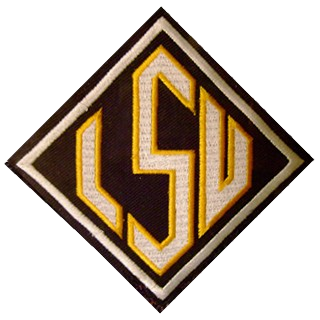
The Louisiana State University Tiger Marching Band is the marching band of Louisiana State University (LSU). The band has 370 members and performs at all LSU football home games, all bowl games, and away games.
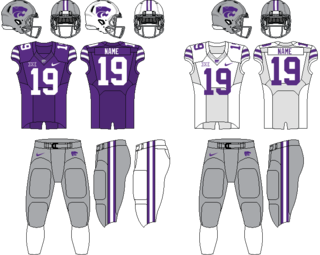
The Kansas State Wildcats football program is the intercollegiate football program of the Kansas State University Wildcats. The program is classified in the NCAA Division I Bowl Subdivision (FBS), and the team competes in the Big 12 Conference.
